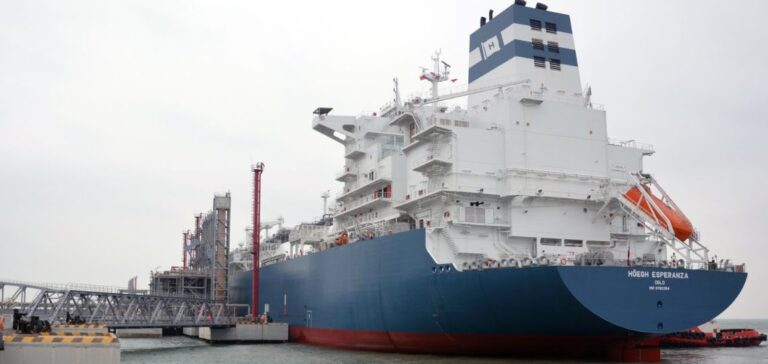When ships replace pipelines: Germany has inaugurated its first liquefied gas terminal, designed to avoid shortages and replace Russian deliveries, halted by the war in Ukraine. But short-term supply remains uncertain.
“This is a good day for our country,” said Chancellor Olaf Scholz, dressed in a fluorescent yellow jacket, on the deck of a ship, a few meters from the terminal in Wilhelmshaven, on the North Sea.
The FSRU (floating storage and regasification unit) “Hoegh Esperanza”, moored since Thursday at about 300 meters from there, sounded its siren as it approached the boat where the head of state had taken place, accompanied by several ministers, local councillors and journalists, in cold and foggy weather.
This imposing 300-meter long blue and red naval vessel, cluttered with pipes, has been loaded with enough Nigerian gas for the annual consumption of “50,000 homes” and will begin deliveries on December 22.
Five floating terminals will open in the next few months, after construction work was carried out at full speed thanks to billions of euros released by Berlin.
“We are making ourselves independent of Russian pipelines,” Scholz praised.
These facilities will supply one third of the country’s gas needs, thus warding off, for the time being, the catastrophic scenarios of massive shortages still evoked a few months ago.
Contracts
Floating LNG (Liquefied Natural Gas) terminals allow natural gas to be imported by sea in liquid form. They consist of a mooring platform and a vessel called FSRU, where the LNG is delivered, stored and regasified, before being sent to the network.
Unlike other European countries, Germany did not have any terminals on its soil, preferring the cheap resource coming from Russian pipelines, on which it depended for 55% of its imports.
Everything changed with the war in Ukraine and the end of deliveries from Russian Gazprom.
Imports of liquefied gas to Germany via Belgian, Dutch and French ports have surged.
To avoid prohibitive transport costs, the country has decided to launch several terminal projects on its own soil.
But Germany has still not signed any significant gas contracts to fill these terminals in the immediate future.
“The import capacity will be there. But what worries me are the deliveries,” Johan Lilliestam, a researcher at the University of Potsdam, told AFP.
A contract between the American company ConocoPhillips and Qatar has been signed for the Wilhelmshaven terminal. However, gas deliveries will not begin until 2026.
Negotiations between German energy companies, led by RWE and Uniper, and the main global suppliers, such as Qatar, the United States and Canada, are stalling.
Producers are looking for long term contracts to make their investments profitable, while Berlin wants short term contracts in order to gradually move away from fossil fuels.
Environmental organizations are already concerned that these LNG projects will jeopardize the government’s climate goals.
A dozen environmental activists demonstrated in Wilhelmshaven on Saturday morning, with signs calling for an “end to gas”, AFP noted.
Cuts
“If we want to supply liquefied gas to Germany for the long term, we will have to conclude contracts for long periods,” Holger Kreetz, operational director of Uniper, which manages the Wilhelmshaven terminal, admitted on Saturday, interviewed by AFP.
Without a significant contract, Germany is exposed to the volatility of the short-term spot markets for its supplies.
Prices have certainly fallen since the summer. But the market could tighten as early as 2023, due to the recovery of demand in China, which is slowly abandoning the “zero Covid” policy.
And the current cold winter in Germany could empty the tanks faster than expected.
“We cannot exclude blackouts for the next winter”, says Andreas Schroeder, an expert for the London-based ICIS.
The German authorities therefore call on the population to continue their efforts to save the resource.
“We are far from being out of the woods,” said German Economy Minister Robert Habeck on Saturday, also in Wilhelmshaven.
Berlin’s goal is to save 20% of gas this winter, compared to 13% currently.





















